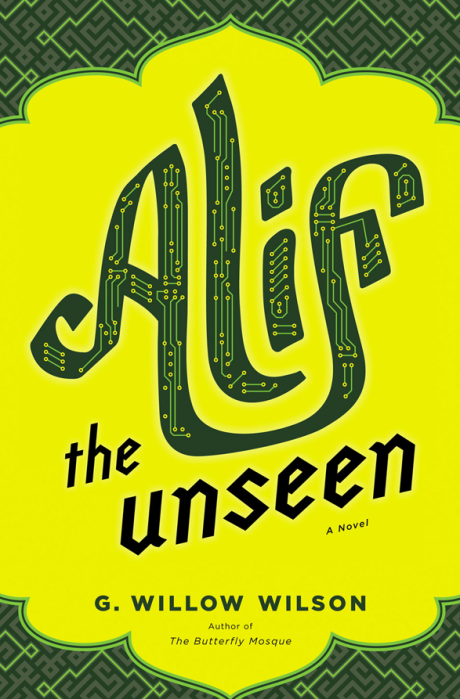Review: Alif the Unseen
 Alif the Unseen is a novel about political unrest in the Middle East, fueled by hackers and subversives on the internet who are angry about the way their governments are controlling their lives and cracking down hard on the digital world. This virtual unrest eventually leads to a revolution of sorts, but according to the author, G. Willow Wilson, an award-winning writer of graphic novels working in prose for the first time, the book was already in editing when the winter of 2011 turned into the Arab Spring. Though the story is tempered with elements of the fantastical—it’s also a novel in which the djinn are literal and magic computer code might be able to rewrite reality—that anger gives it an undeniable energy and relevance.
Alif the Unseen is a novel about political unrest in the Middle East, fueled by hackers and subversives on the internet who are angry about the way their governments are controlling their lives and cracking down hard on the digital world. This virtual unrest eventually leads to a revolution of sorts, but according to the author, G. Willow Wilson, an award-winning writer of graphic novels working in prose for the first time, the book was already in editing when the winter of 2011 turned into the Arab Spring. Though the story is tempered with elements of the fantastical—it’s also a novel in which the djinn are literal and magic computer code might be able to rewrite reality—that anger gives it an undeniable energy and relevance.
But let’s not get too serious. Because like I said: the djinn are real, and at one point, one of them gets trapped in a soda bottle. So this isn’t C-SPAN or anything.
Alif is the nom de modem of our protagonist, a geeky teenage hacker living in an unnamed but oppressively governed Middle Eastern state. Alif is trapped between two cultures and two classes, the product of a failed marriage between a powerful Arab businessman and a middle class Indian women. He never feels he truly belongs anywhere except online, where he works as a “gray hat” hacker, selling his skills in digital wizardy to anyone who will pay his price, provided they are acting against the all-powerful State and its shadowy internet security expert, whom Alif and his buddies have dubbed The Hand. Offline, his life isn’t quite as dramatic. As the book opens, he’s just been dumped by his girlfriend, a rich girl whose parents have arranged a much more profitable marriage for her than the one she’d have with the guy who sometimes forgets to shower after an all-night coding session.
But things finally get more exciting for Alif—and readers, because reading about lovesick moping teenagers is almost never fun—when he is passed a mysterious ancient book, the Alf Yeom, filled with the myths and legends of the Unseen world that exists next to ours and the immortal djinn who populate it, and suddenly (but probably not coincidentally) finds himself the most wanted hacker in the country. Oh, and all of those djinn turn out to be real, and not all of them are good, or even very nice. And more than a few are working for The Hand.
From there, the novel hardly pauses for breath as it rushes from one fantastical sequence to another and Alif tries to stay one step ahead of The Hand with the help of devout girl-next-door Dina, who wears the veil (but that isn’t enough to blind readers to the fact that she is obviously going to be the love interest), and an only-slightly-nasty djinn named Vikram the Vampire (non-sparkly). Amid all the last-minute escapes (and boy, are there a lot of them) are passages from the Alf Yeom itself, and they are the best part of the book. Reminiscent of The Thousand and One Nights (whose star genie also makes an appearance), these bits of Islamic lore provide a fascinating peek into the traditions of what is, at least to me, a fairly foreign world.
As enjoyable as the blending of the technological and the fantastic may be, and as hot-off-the-presses contemporary as the revolutionary theme feel, Alif the Unseen is also pretty familiar in a lot of ways. This is Wilson’s first novel, and you can kind of tell. Her ideas are imaginative, but the ways she employs them will remind you of a lot of other books, among them Jonathan Stroud’s wonderful Bartemaeus books, the language virus of Neal Stephenson’s Snow Crash, and an ending ripped whole cloth from The Neverending Story. The one-chase-sequence-after-another plotting, the bad guy so evil he’s surely torturing puppies every time he leaves the page, a love story where the guy can’t see the amazing girl right in front of him until she takes off her glasses veil—they all give this book the feel of a young adult novel, even as you sense the author straining to make a grand statement. She also has a few writer’s ticks that got on my nerves, none more so than the fact that her characters are constantly almost soiling themselves in fright (more than almost in one case). After about the fourth reference to fright-induced excrement, I started wondering how often that really happens to people, and thoughts like that only lead you to depths of Wikipedia best left unplumbed (pun unintended).
The degree to which Alif the Unseen impresses you will likely vary based on your familiarity with the subject matter and with cyberpunk tropes in general, but as a first effort, it proves that the author is one to watch.